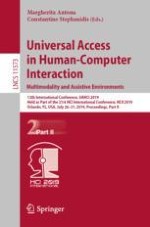2019 | OriginalPaper | Chapter
Caregivers’ Influence on Smartphone Usage of People with Cognitive Disabilities: An Explorative Case Study in Germany
Authors : Vanessa N. Heitplatz, Christian Bühler, Matthias R. Hastall
Published in: Universal Access in Human-Computer Interaction. Multimodality and Assistive Environments
Publisher: Springer International Publishing
Activate our intelligent search to find suitable subject content or patents.
Select sections of text to find matching patents with Artificial Intelligence. powered by
Select sections of text to find additional relevant content using AI-assisted search. powered by
